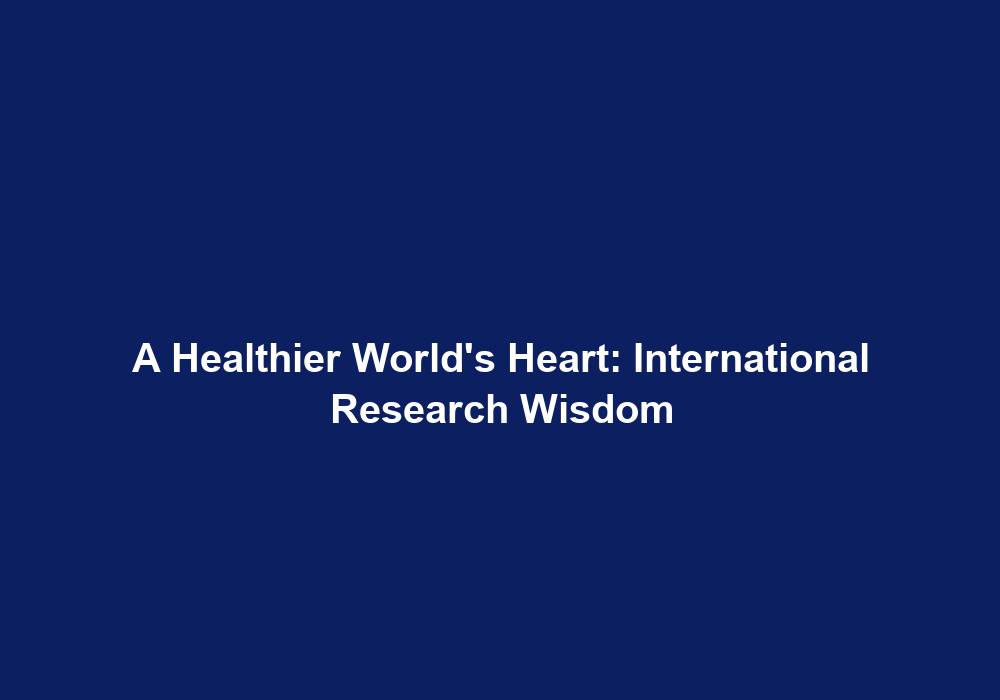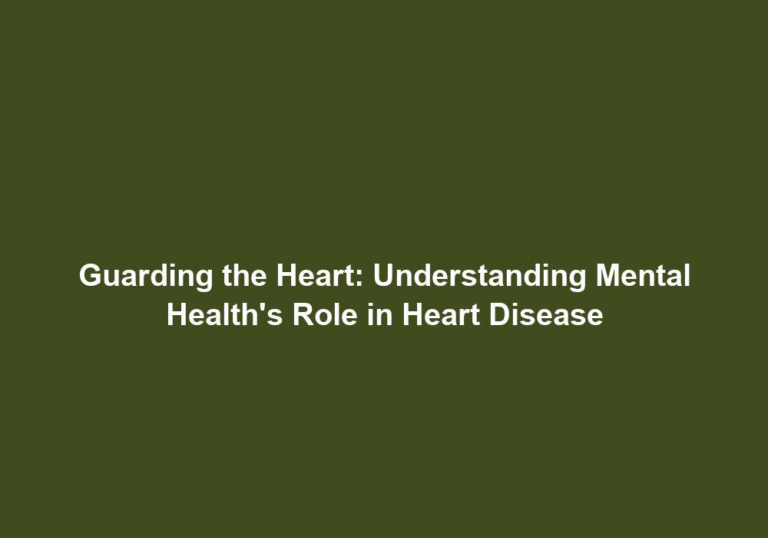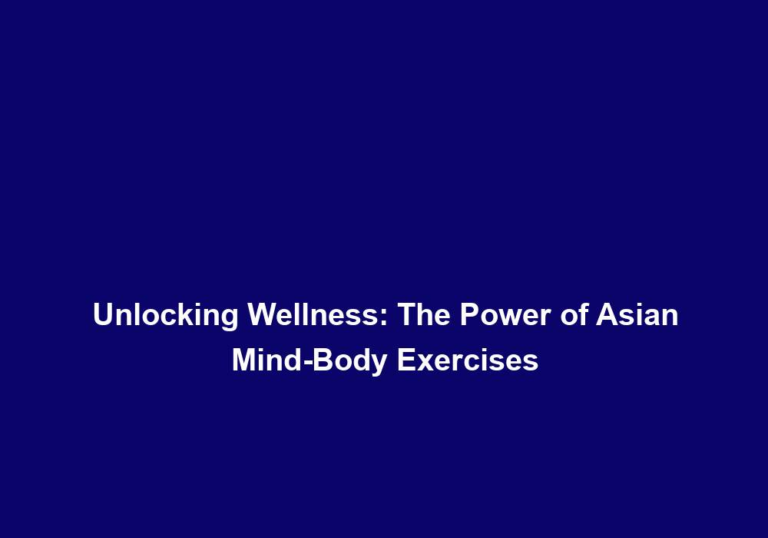A Healthier World’s Heart: International Research Wisdom
In today’s fast-paced world, the pursuit of good health has become a top priority for individuals and societies alike. As we strive to lead a healthier lifestyle, it is crucial to stay informed about the latest research and global perspectives on wellness. This article aims to shed light on the international research wisdom that can contribute to a healthier world’s heart.
Understanding the Global Health Landscape
Before delving into the research findings, it is essential to understand the global health landscape and the challenges we face as a global community. A myriad of factors such as lifestyle choices, environmental issues, and socioeconomic disparities have a significant impact on our cardiovascular health.
Lifestyle Choices and Cardiovascular Health
Our lifestyle choices play a pivotal role in shaping our cardiovascular health. Research has consistently shown that factors such as diet, physical activity, smoking, and alcohol consumption directly affect the heart’s well-being.
- Diet: Adopting a balanced diet that includes a variety of fruits, vegetables, whole grains, lean proteins, and healthy fats is crucial for maintaining a healthy heart. Avoiding processed foods, sugary beverages, and excessive salt intake can help reduce the risk of cardiovascular diseases. It is important to emphasize the Mediterranean diet, which has been extensively studied and proven to be beneficial for heart health. This dietary pattern, rich in fruits, vegetables, whole grains, legumes, and healthy fats like olive oil, has been associated with a lower risk of heart disease and stroke.
- Physical Activity: Engaging in regular physical activity is essential for a healthier heart. Aim for at least 150 minutes of moderate-intensity exercise per week. This can include activities like brisk walking, swimming, cycling, or any other form of aerobic exercise that elevates your heart rate. Additionally, incorporating strength training exercises into your routine can help improve cardiovascular fitness. Regular physical activity not only reduces the risk of heart diseases but also helps in maintaining a healthy weight, managing blood pressure, and improving overall well-being.
- Smoking: Quitting smoking is one of the most important steps you can take to improve your heart health. Smoking damages the blood vessels, increases blood pressure, and raises the risk of heart attacks and strokes. Seek support from healthcare professionals, join smoking cessation programs, and utilize nicotine replacement therapies if needed. Creating smoke-free environments and implementing strict regulations on tobacco sales and marketing are also crucial in reducing the global burden of cardiovascular diseases.
- Alcohol Consumption: While moderate alcohol consumption may have some cardiovascular benefits, excessive drinking can have detrimental effects on the heart. It is recommended to limit alcohol intake to moderate levels, which means up to one drink per day for women and up to two drinks per day for men. It is important to note that non-drinkers should not start drinking for the potential health benefits. If you choose to drink, do so in moderation and be aware of the potential risks associated with alcohol.
Environmental Issues and Cardiovascular Health
Beyond individual choices, the environment we inhabit also has a profound impact on our cardiovascular health.
- Air Pollution: Air pollution is a major environmental factor that contributes to the development of cardiovascular diseases. Exposure to pollutants such as fine particulate matter, nitrogen dioxide, and ozone has been linked to an increased risk of heart attacks, stroke, and other cardiovascular ailments. To reduce the risk, it is essential to support efforts to reduce air pollution and promote cleaner environments. This can be achieved through stricter regulations on industrial emissions, promoting renewable energy sources, improving public transportation systems, and advocating for green spaces in urban areas.
- Noise Pollution: Noise pollution, particularly from traffic and urban environments, can also negatively affect cardiovascular health. Prolonged exposure to high levels of noise has been associated with increased blood pressure, stress hormone levels, and cardiovascular diseases. Implementing noise reduction strategies, such as building noise barriers, promoting quieter transportation systems, and designing urban areas that prioritize noise reduction, can contribute to a healthier world’s heart.
- Climate Change: Climate change poses significant threats to cardiovascular health. Rising temperatures, extreme weather events, and changes in air quality can exacerbate cardiovascular conditions and increase the risk of heart-related emergencies. Mitigating climate change through sustainable practices, reducing greenhouse gas emissions, and transitioning to clean energy sources is imperative for protecting our cardiovascular health and the health of future generations.
Socioeconomic Disparities and Cardiovascular Health
Socioeconomic disparities play a significant role in determining the overall cardiovascular health of populations.
- Access to Healthcare: Individuals from lower socioeconomic backgrounds often face barriers to accessing quality healthcare, including preventive services and timely treatment for cardiovascular conditions. It is crucial to address these disparities by promoting equitable access to healthcare, ensuring affordable health insurance coverage, and expanding healthcare facilities in underserved areas. Community outreach programs and mobile health clinics can also help reach populations with limited access to healthcare services.
- Education and Awareness: Education plays a vital role in promoting heart-healthy behaviors and empowering individuals to make informed decisions about their cardiovascular health. Implementing school-based health education programs that focus on nutrition, physical activity, and the dangers of smoking can instill lifelong habits in children and adolescents. Additionally, community-wide awareness campaigns can help disseminate information about the importance of cardiovascular health and provide resources for prevention and management.
- Social Support and Resources: Building strong social support networks and providing resources to individuals from disadvantaged backgrounds can help alleviate the burden of cardiovascular diseases. Programs that offer financial assistance for healthcare services, healthy food options, and opportunities for physical activity can make a significant difference in improving cardiovascular health outcomes. Collaborative efforts between governments, non-profit organizations, and community leaders are essential in addressing socioeconomic disparities and creating a healthier world’s heart for all.
International Research Findings: Insights and Recommendations
Now, let us delve into some key international research findings that provide valuable insights and recommendations for a healthier world’s heart.
Mediterranean Diet: A Heart-Healthy Regimen
Numerous studies have highlighted the benefits of the Mediterranean diet in promoting cardiovascular health. This dietary pattern, rich in fruits, vegetables, whole grains, legumes, and healthy fats like olive oil, has been associated with a lower risk of heart disease and stroke.
- Benefits of the Mediterranean Diet: The Mediterranean diet is not just about individual food choices but also emphasizes overall dietary patterns. It is abundant in antioxidants, vitamins, minerals, and fiber, which contribute to heart health. The diet’s emphasis on plant-based foods, lean proteins, and healthy fats helps in reducing inflammation, improving cholesterol levels, and maintaining a healthy weight. It also includes moderate consumption of red wine, which contains antioxidants that may have additional cardiovascular benefits.
- Adopting the Mediterranean Diet: To adopt the Mediterranean diet, focus on incorporating more fruits, vegetables, whole grains, legumes, nuts, and seeds into your meals. Replace unhealthy fats with healthy fats like olive oil and avocados. Limit red meat consumption and opt for lean proteins such as fish, poultry, and plant-based sources. Enjoy moderate amounts of dairy products, including yogurt and cheese. Lastly, reduce the intake of processed foods, sugary beverages, and high-sodium foods.
Physical Activity: A Universal Key to Heart Health
International research has consistently emphasized the importance of regular physical activity in maintaining good cardiovascular health.
- Benefits of Physical Activity: Regular physical activity has numerous benefits for the heart. It helps in improving heart muscle function, reducing blood pressure, increasing HDL (good) cholesterol levels, and managing weight. Physical activity also improves blood circulation, reduces inflammation, and enhances overall cardiovascular fitness. Additionally, it plays a crucial role in stress management and mental well-being.
- Incorporating Physical Activity: Aim for at least 150 minutes of moderate-intensity aerobic exercise or 75 minutes of vigorous-intensity exercise per week. This can include activities like brisk walking, jogging, swimming, cycling, dancing, or any other form of exercise that increases your heart rate. If you’re just starting, begin with shorter periods of activity and gradually increase the duration and intensity. Remember to warm up before exercising and cool down afterward to prevent injury. Find activities that you enjoy and make them a part of your daily routine.
Smoking Cessation: A Global Imperative
Tobacco smoking remains a significant global health challenge, contributing to millions of deaths each year.
- Effects of Smoking on the Heart: Smoking damages the blood vessels, reduces oxygen supply to the heart, increases blood pressure, and promotes the formation of blood clots. These factors significantly raise the risk of heart attacks, strokes, and other cardiovascular diseases. Secondhand smoke is also harmful, especially for children and individuals with pre-existing heart conditions.
- Quitting Smoking: Quitting smoking is the best decision you can make for your heart health. It is never too late to quit, and the benefits are immediate. Seek support from healthcare professionals, utilize nicotine replacement therapies, and join smoking cessation programs or support groups. Surround yourself with a smoke-free environment and avoid triggers that may tempt you to smoke. Remember that quitting smoking not only benefits your heart but also reduces the risk of various cancers, respiratory diseases, and improves overall quality of life.
Stress Management: A Holistic Approach
Chronic stress has been identified as a risk factor for cardiovascular diseases.
- Effects of Stress on the Heart: Prolonged stress can lead to increased blood pressure, heightened inflammation, and unhealthy coping behaviors such as overeating, smoking, or excessive alcohol consumption. These factors contribute to the development and progression of cardiovascular conditions.
- Stress Management Techniques: Practicing stress management techniques can significantly improve heart health. Mindfulness meditation, yoga, deep breathing exercises, and relaxation techniques help reduce stress hormones, lower blood pressure, and promote overall well-being. Engaging in hobbies, spending time with loved ones, and participating in activities that bring joy and relaxation are also effective stress relievers. It is important to prioritize self-care and create a balance between work, personal life, and leisure time.
Cardiovascular Disease Prevention: A Lifelong Commitment
Preventing cardiovascular diseases is a lifelong commitment that starts from a young age.
- Early Interventions: Research suggests that early interventions and preventive measures are vital in instilling heart-healthy habits in children and adolescents. Promoting healthy lifestyles, including nutritious diets and regular physical activity, should be a priority in schools and communities. Implementing school-based health education programs that provide knowledge and skills for maintaining good cardiovascular health can have long-term benefits.
- Emphasizing Prevention: Prevention should be at the forefront of healthcare strategies. Encouraging routine check-ups, screenings for high blood pressure and cholesterol levels, and promoting awareness about the signs and symptoms of cardiovascular diseases can help identify risks early on. Creating supportive environments that promote healthy behaviors, such as workplace wellness programs and community initiatives, also play a significant role in prevention efforts.
Conclusion
In conclusion, a healthier world’s heart relies on a comprehensive understanding of international research wisdom. By considering global perspectives on lifestyle choices, environmental issues, and socioeconomic disparities, we can make informed decisions to improve cardiovascular health. Embracing heart-healthy regimens such as the Mediterranean diet, engaging in regular physical activity, quitting smoking, managing stress, and prioritizing prevention are key steps towards a healthier future. Let us join hands as a global community and work together to build a world where a healthier heart is within everyone’s reach.







